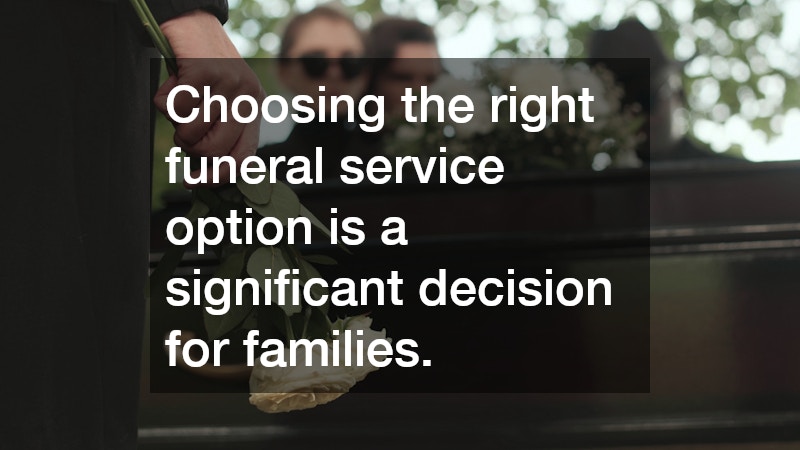Understanding funeral service options can be challenging for families during a difficult time. This article aims to illuminate the various choices available, helping families to make informed decisions that honor their loved ones in the best way possible.
What are the Different Types of Funeral Services Available?
Traditional Funeral Services
Traditional funeral services are structured and respect long-established rituals. Typically, these include a viewing or wake, a formal service conducted in a religious or secular space, and a burial ceremony at a cemetery, which offers families a chance to say their final goodbyes in a manner that honors familial and cultural expectations.
This type of service often involves years of tradition, which can bring comfort to those who find solace in routine and known rituals. Many choose traditional funeral services because they provide a familiar setting and a sense of closure by fully honoring the life of the deceased.
Despite the strict framework, there is some degree of personalization available in traditional funerals, such as choosing specific hymns or prayers. It is important to work with a funeral director who understands how to harmonize these choices while maintaining respect for traditional elements.
Alternative Funeral Services
Alternative funeral services are gaining popularity as families seek more personalized and cost-effective options. Options such as direct cremation, where the body is cremated soon after death without a traditional funeral, provide eco-friendly choices that reduce carbon footprints.
Green burials, which avoid embalming fluids and utilize biodegradable caskets, cater to environmentally conscious families. This choice also honors the natural cycle of life and death, making it a meaningful option for those who value sustainability.
Cremation is often more cost-effective and flexible, allowing families to hold a service that best fits their preferences, such as a memorial weeks or months after the cremation. These services offer a vast degree of personalization, from the choice of location to the means of memorializing the deceased.
How Much Do Funeral Services Usually Cost?
Cost Breakdown of Funeral Services
Funeral services can vary widely in cost, depending on personal choices and regional differences. Expenses can include the casket, embalming, service fees, transportation, and cemetery charges, among others.
Understanding the breakdown of costs can help families prepare and make financial plans. On average, a traditional funeral service can range from $7,000 to $12,000, making it critical to have transparent discussions about finances.
Some service providers offer itemized pricing, allowing families to make choices based on budget constraints. This can help to avoid any hidden fees and ensures families have a clear understanding of what they will pay for each service element.
Ways to Save on Funeral Expenses
Pre-planning is a significant way families can save on funeral expenses, as it allows for both financial planning and price locking in advance. Another strategy is to consider less expensive alternatives, such as choosing cremation over burial or selecting a simpler casket design.
Many families find it beneficial to research and select specific services that meet their needs without excess. By choosing alternative services or combining service elements, families can create a meaningful event without overspending.
Additionally, shopping around and comparing service providers can lead to substantial savings. Some funeral homes offer package deals that can lessen the financial burden while still delivering a respectful and personalized service.
How to Personalize a Funeral Service?
Incorporating Personal Touches
Personalizing a funeral service can greatly enhance its significance and reflect the life and passions of the deceased. Families can incorporate personal touches such as choosing music that resonates with their loved one or selecting specific readings that carry special meanings.
Additionally, the use of customized decorations or video tributes can offer a heartfelt representation of a loved one’s life. By including cherished memories and personal anecdotes, families create a space where guests can connect and remember.
Another popular choice is to focus on a theme that best represents the person’s interests. These bespoke elements not only honor the deceased but also provide comfort and connection to those attending the service.
Cultural and Religious Considerations
Every family has unique cultural and religious needs that should be respected in a funeral service. Understanding these customs is crucial in planning a ceremony that aligns with deeply held beliefs and traditions.
For example, Jewish funerals traditionally emphasize simplicity and swift burial, whereas Hindu ceremonies might include a cremation ritual followed by a series of mourning days. These diverse traditions highlight the need to approach funeral planning with sensitivity and awareness.
Working with a funeral director who is knowledgeable about specific religious customs can ensure that all necessary rituals are performed, offering peace of mind to families. Ultimately, respecting these practices underscores the importance of cultural heritage in the grieving process.
Choosing the right funeral service option is a significant decision for families. By evaluating various services and considering costs, personalization, and cultural needs, families can create a meaningful and respectful farewell for their loved ones.
Informed decision-making allows for a balance between honoring the deceased and managing practicalities. This way, families can ensure a service that genuinely reflects the life and legacy of their loved one.
Ultimately, by taking the time to understand the options and plan accordingly, families can craft a farewell that embraces both tradition and personal preference. This process fosters healing and celebrates the life of the deceased with dignity and respect.

